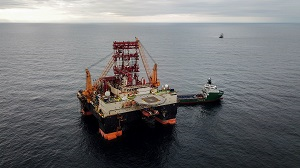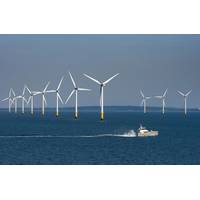Rosneft, Eni Fail to Discover Oil at Black Sea Well
Rosneft chief executive, Igor Sechin, has partnered with a number of foreign companies to develop Russia's offshore regions, though western sanctions have forced some of its partners such as ExxonMobil to suspend projects.
Sechin has counted on the Black Sea as an area with high potential and any discovery would help send a message that the sanctions will not seriously hamper Rosneft's global standing or cooperation with other global players.
But the well, "Maria-1", which Rosneft and Eni started to drill in December, did not bring the desired results, a source close to operations said. Rosneft had planned a second well if the first showed hydrocarbon potential.
"There will be nothing. Nothing was found," the source familiar with the operation said. "Demobilisation (of equipment) has started."
Eni, which holds a 33.33 percent stake in the Zapadno-Chernomorskaya project, declined to comment.
In the Black Sea, Rosneft faces a technically challenging project. "Not a single well has been drilled in the deep water Russian offshore (in the Black Sea)," Sechin said back in December.
The ultra-deep-water prospecting and appraisal well was drilled using the Scarabeo-9 rig and Rosneft said this week it had a target depth of 6,126 metres.
Contrary to previous statements when Rosneft has discovered oil, on Wednesday the company confirmed that drilling was complete and referred only to finding a "carbonate structure".
"As a result of the work, a unique carbonate structure... was discovered, which is a fractured reservoir that is highly likely to contain hydrocarbons," Rosneft said, without giving details of how much or what type of hydrocarbons the structure may contain.
"The obtained results inspire confidence in the discovery of large oil and gas deposits in the Russian area of the Black Sea," Rosneft said, adding that it will now carefully study the material received by the drilling.
The wording contrasts with Rosneft's statement following the completion of drilling on the first well in its Kara Sea project in September 2014.
Back then, Rosneft reported it found oil and Sechin took a group of reporters and TV crews to the Kara Sea.
Valery Nesterov, an analyst with Sberbank CIB, said that given there was no information about any oil flow from the "Maria-1" well, Rosneft may need additional drilling.
"The issue of carbonate structures is a high oil movement inside a layer," Nesterov said. The high movement means that oil can migrate from one part of the structure to another and can be hard to track, if at all.
According to ThomsonReuters tracking data, the Scarabeo-9 rig started to move to the Romanian port of Constanta on March 19 and is expected to arrive there on March 24.
Eni, in contrast to its global peers, does not yet have any oil producing projects in Russia and has teamed up with Rosneft in the Black Sea and the Barents Sea in Russia's Arctic.
Nesterov said that it was important to note that Eni has not pulled out of the partnership with Rosneft, despite what he described as 'not very active' cooperation. "Eni does not announce the exit and this is positive," he said.
Rosneft said last December that oil resources in the licence area in the Black Sea were estimated at over 570 million tonnes, or equal to more than two years of Rosneft's current oil production.
The partnership has yet to begin drilling in the Barents Sea.
Reporting by Denis Pinchuk; additional reporting by Gleb Stolyarov in MOSCOW and Giancarlo Navach in MILAN












